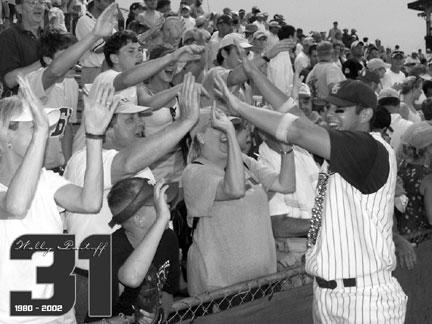I never knew Wally Pontiff. Not in the way a countless number of people in the Baton Rouge and Metairie area did, anyway. I never grew up playing little league baseball with him or sat in the dugout to talk baseball and life with him like two of my colleagues did.
What little I did get to see of the third baseman was confined to watching LSU baseball games on television in 2001 and covering the 2002 Super Regional in Houston. Though I never had the honor of experiencing a personal relationship with Wally, on July 24, 2002, I truly saw what he meant to everyone, and the numerous lives he touched.
It was about 10 a.m. when someone came into the newsroom and uttered those dreaded words – “I heard Wally Pontiff died.” An hour later, the worst fears were confirmed and a press conference was set for 2 p.m.
At the conference, Pontiff’s teammates sat distraught, not speaking to the media for obvious reasons, but listening to Athletics Director Skip Bertman, who had recruited Pontiff and coached him to a national title in 2000. It was clear the tragic loss shook everyone there and the LSU community wouldn’t be the same.
A month after Pontiff’s death, the Jefferson Parish Coroner confirmed the 21-year-old junior died of a heart abnormality.
Much like another LSU great “Pistol” Pete Maravich, Pontiff’s condition was undetectable. It’s ironic to say Pontiff’s heart had an “abnormality.” Those who knew him would say there was nothing wrong with his heart.
Recently, organizations have paid tribute to Pontiff. The Tiger Athletic Foundation has started selling two prints of Pontiff, with proceeds going to the Wally Pontiff Memorial Scholarship for future LSU baseball players. The Metairie playground where Pontiff once roamed was renamed the Wally Pontiff Junior Playground in his honor, and a marble monument was erected with his likeness on it.
LSU baseball coach Smoke Laval said after Pontiff died, he made a lot of phone calls to get advice about how to deal with his grief.
“That was one of the toughest things I had to do – hopefully it’s the toughest I ever have in coaching – and they said don’t ignore it,” Laval said. “From day one, keep bringing him up, keep bringing him up, and we do. They go out there and say the prayer by his number, so he was always there.”
Pontiff, as Bertman said, was “Everybody’s All-American,” the same name as the 1988 movie adaptation of Frank Deford’s novel.
Just like the story’s athletic hero – Gavin Grey, who was known as “The Gray Ghost” – Pontiff excelled at everything he did.
He had a 3.4 grade point average in biological sciences and was drafted in the 21st round of the Major League Baseball draft in 2002. He essentially was the team captain during his junior year and hit .344 for his LSU career.
Laval, who broke down several times at the press conference, said Pontiff would have excelled at whatever he did, whether it was playing baseball, becoming a doctor or raising a family. Pontiff would have done all those things with the grace and humility he displayed his whole life.
During the post-game interview following LSU’s 2002 Super Regional loss to Rice, Pontiff promised the media the Tigers would go to the College World Series in 2003.
Though he never physically got the chance, Pontiff fulfilled that promise with his teammates in spirit, as the Tigers made their 12th appearance in Omaha, Neb.
“He’s been with us, all year,” said LSU shortstop Aaron Hill. “I think every game we’ve gone out there and said a prayer and everybody touched his number [on the center field wall]. He’s been with us all weekend too. I think he’s helped us with three balls that should have been out of the park. Every one knows his presence is there.”
After the players recorded the last out in a 20-5 win over Baylor to reach the CWS, they dogpiled on each other near the pitcher’s mound, then they all ran to center field and knelt in front of Pontiff’s retired number on the wall.
The fans at Alex Box Stadium showed their appreciation as well. In the top of the ninth inning in the championship game, the record 7,492 fans in attendance began chanting “Wally” and “31.”
“I respect greatly the fans’ love for Wally and all he meant to LSU baseball, the players and coaches,” said Baylor coach Steve Smith after the game. “I have great respect for that, and I’m sure that the outcry we witnessed out there by the fans was simply their way of showing further respect, further admiration for him.”
Few words do justice to the type of man Wally Pontiff was. You’d have to look into those eyes and see that big, flashy grin on his face. Then maybe you’d get an idea of what kind of man he was.
To those fortunate enough to have known him and to all the friends and family Wally touched along the way, I consider you lucky to have known him. I wish I knew back then that I was in the presence of such a great man.
Wally Pontiff lives on
July 24, 2003

Wally Pontiff lives on



